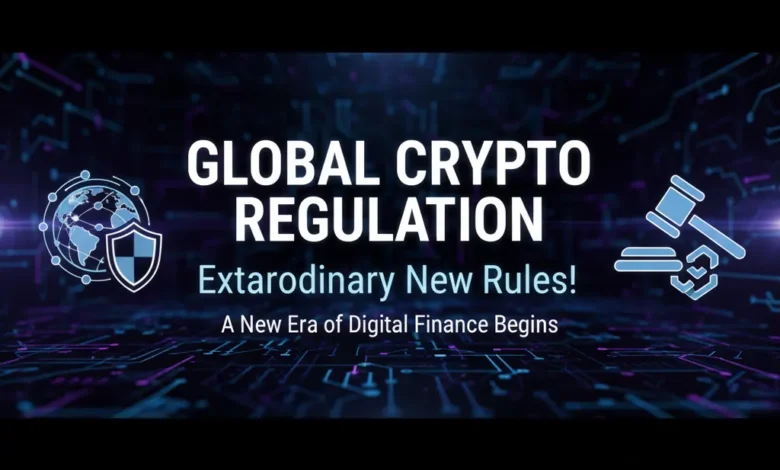
Global crypto regulation Extraordinary New Rules!, Stay ahead of the curve with the latest global crypto regulations. Discover the extraordinary new rules impacting the future of digital assets, along with learn how businesses along with individuals can navigate this evolving landscape with confidence along with strategic foresight.
Global crypto regulation: A Shifting Landscape
The realm of global crypto regulation is undergoing a period of intense transformation. What was once a largely unregulated space is rapidly becoming subject to increasingly complex along with diverse sets of rules. This shift is driven by a growing awareness among governments worldwide of the potential risks along with benefits associated with cryptocurrencies, digital currencies, along with blockchain tech. The implications for businesses along with individuals operating within this space are significant, demanding a proactive approach to digital asset compliance along with a deep understanding of the ever-changing crypto regulatory landscape.
One of the primary drivers behind this regulatory push is the concern over financial stability. Jurisdictions are grappling with how to integrate digital currencies into existing financial systems without destabilizing them. This involves addressing issues such as money laundering, terrorist financing, along with consumer protection. Another key factor is the desire to capture tax revenue generated by crypto-related activities. Governments are developing frameworks to effectively tax crypto transactions along with investments, ensuring fair contribution to public finances. The need to protect investors from fraud along with scams also plays a crucial role in shaping global crypto policy.
Understanding the Diversity of Global Crypto Policy
A significant challenge in navigating the global crypto regulatory landscape is the lack of uniformity across jurisdictions. Different countries along with regions are adopting vastly different approaches, ranging from outright bans to embracing innovation through regulatory sandboxes. Some jurisdictions are taking a cautious approach, focusing primarily on risk mitigation along with consumer protection. Others are actively promoting the development of the digital asset industry, recognizing its potential to drive economic growth along with technological advancement. Understanding these nuances is critical for businesses operating internationally.
For instance, some jurisdictions are implementing comprehensive licensing regimes for crypto exchanges along with custody providers, requiring them to meet stringent capital requirements along with adhere to anti-money laundering (AML) along with know-your-customer (KYC) regulations. Other jurisdictions are focusing on regulating stablecoins, recognizing their potential to disrupt traditional payment systems. Still others are taking a more hands-off approach, allowing the market to develop organically while monitoring for potential risks. Staying informed about these diverse approaches is essential for ensuring compliance along with avoiding potential legal pitfalls.
Digital Asset Compliance: A Step-by-Step Guide
Achieving digital asset compliance in the face of evolving global crypto regulation requires a strategic along with proactive approach. Here’s a step-by-step guide to assist businesses along with individuals navigate this complex terrain:
1. Conduct a Regulatory Assessment: Begin by thoroughly assessing the regulatory requirements in each jurisdiction where you operate alternatively intend to operate. Identify the specific laws along with regulations that apply to your crypto-related activities, including licensing requirements, AML/KYC obligations, along with tax implications. This assessment should be updated regularly to reflect changes in the crypto regulatory landscape.
2. Implement Robust AML/KYC Procedures: Develop along with implement robust AML/KYC procedures to prevent illicit activities along with comply with regulatory requirements. This includes verifying the identity of your customers, monitoring transactions for suspicious work, along with reporting any suspicious transactions to the relevant authorities. Employing advanced technologies like blockchain analytics can enhance your AML/KYC efforts.
3. Establish a Compliance Framework: Create a comprehensive compliance framework that outlines your policies along with procedures for complying with global crypto regulation. This framework should include clear lines of responsibility, training programs for employees, along with regular audits to ensure ongoing compliance. Consider appointing a dedicated compliance officer to oversee your compliance efforts.
4. Engage with Regulators: Proactively engage with regulators to understand their expectations along with provide feedback on proposed regulations. Building relationships with regulators can assist you stay ahead of the curve along with ensure that your business practices are aligned with regulatory requirements. Consider participating in industry consultations along with workshops to contribute to the development of sound crypto regulation.
5. Leverage tech Solutions: Utilize tech solutions to automate compliance processes along with enhance efficiency. There are a variety of software platforms available that can assist you manage your AML/KYC obligations, track transactions, along with generate compliance reports. These solutions can significantly lessen the burden of compliance along with minimize the risk of errors.
6. Stay Informed: The global crypto regulatory landscape is constantly evolving, so it’s essential to stay informed about the latest developments. Subscribe to industry newsletters, attend conferences, along with follow regulatory agencies on social media to stay up-to-date on the latest news along with guidance. Consider engaging with legal along with compliance experts to ensure that you have access to the most current insight along with advice.
Bitcoin Regulation along with the Broader Digital Currency Ecosystem
While the term “Bitcoin regulation” often comes up, it’s critical to understand that regulation extends far beyond just Bitcoin. The regulatory focus encompasses the broader digital currency ecosystem, including stablecoins, central bank digital currencies (CBDCs), along with other forms of virtual assets. Bitcoin, as the original along with most well-known cryptocurrency, often serves as a benchmark for regulatory approaches, nevertheless the specific rules along with requirements can vary depending on the type of digital currency along with its intended apply.
For instance, stablecoins, which are designed to maintain a stable value relative to a traditional currency, are subject to increasing regulatory scrutiny due to their potential to disrupt traditional payment systems along with their exposure to risks such as reserve management along with operational resilience. CBDCs, which are digital currencies issued by central banks, are also attracting significant regulatory attention as governments explore the potential benefits along with challenges of introducing these new forms of money. The regulation of these diverse types of digital currencies requires a nuanced approach that takes into account their unique characteristics along with potential impact on the financial system.
DeFi Regulation: Addressing the Challenges of Decentralization
Decentralized finance (DeFi) presents unique challenges for regulators. The decentralized along with often pseudonymous nature of DeFi protocols makes it difficult to apply traditional regulatory frameworks. Regulators are grappling with how to address issues such as money laundering, consumer protection, along with financial stability in the context of DeFi, where there is often no central authority to hold accountable.
One approach being considered is to focus on regulating the on-ramps along with off-ramps to the DeFi ecosystem, such as crypto exchanges along with stablecoin issuers. By regulating these entities, regulators can exert some control over the flow of funds into along with out of DeFi protocols. Another approach is to develop new regulatory frameworks that are specifically tailored to the decentralized nature of DeFi, such as self-regulatory organizations (SROs) alternatively smart contract audits. The regulation of DeFi is a complex along with evolving area, along with it will likely require innovative solutions that strike a balance between promoting innovation along with mitigating risks.
Blockchain Laws along with the Future of Crypto Regulation
The development of blockchain laws is crucial for providing legal certainty along with fostering the responsible innovation of blockchain tech. These laws can address a wide range of issues, including the legal status of digital assets, the enforceability of smart contracts, along with the protection of intellectual property rights on blockchain networks. By providing a clear legal framework, blockchain laws can assist to attract investment, promote adoption, along with prevent illicit activities.
The future of crypto regulation will likely involve a combination of traditional along with innovative approaches. Regulators will continue to adapt existing laws along with regulations to address the challenges posed by cryptocurrencies along with other digital assets, while also exploring new regulatory frameworks that are specifically tailored to the unique characteristics of this emerging tech. The goal is to create a regulatory environment that fosters innovation, protects consumers, along with prevents illicit activities, while also allowing the digital asset industry to thrive.
Staying Ahead in the Global Crypto Regulatory Landscape
To successfully navigate the evolving world of global crypto regulation, businesses along with individuals must prioritize proactive compliance measures along with continuous learning. By understanding the nuances of the regulatory landscape, implementing robust AML/KYC procedures, along with leveraging tech solutions, stakeholders can minimize risks along with capitalize on the opportunities presented by digital assets. Engaging with regulators along with participating in industry discussions will further ensure that businesses are well-prepared for future regulatory changes. The key is to view digital asset compliance not as a burden, nevertheless as an essential component of sustainable growth along with long-term success in the digital economy.
The ongoing advancements in blockchain tech along with the rapid evolution of digital currencies demand continuous adaptation along with strategic thinking. Embrace innovation, stay informed, along with proactively engage with the regulatory community to thrive in the dynamic along with exciting world of global crypto regulation. By taking a proactive along with informed approach, you can confidently navigate the complexities of this evolving landscape along with unlock the full potential of digital assets.




